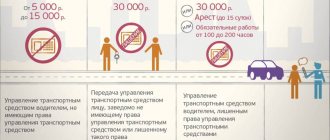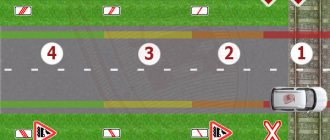The deferments provided by law for a smoother transition of business to the new tax control regime have already expired - which means that the use of online cash registers today is a prerequisite for almost all types of organizations and individual entrepreneurs. Despite the relaxation of certain provisions, including the possibility of replacing monetary penalties with warnings, as well as simplification of the regulations for self-correction of violations, potential audits by tax authorities remain an urgent problem. How much will the fine for a failed check be for individual entrepreneurs and LLCs in 2021, and what liability is provided for the absence or non-use of a cash register? Let's figure it out.
General overview
The norms enshrined in the second part of Article 14.5 of the Code of Administrative Offenses of the Russian Federation determine penalties for legal entities guilty of non-compliance with the rules of trading, or more precisely, violating the procedure for working with online cash registers. For such cases, the law provides for the following types of administrative penalties:
- For officials who have committed an offense, the penalty imposed is from a quarter to half of the amount of the settlement made. At the same time, the fine for failure to use the online cash register will not be less than 10 thousand rubles, and is applied, among other things, to private entrepreneurs, in accordance with the addition to the content of Article 2.4 of the Code.
- For organizations guilty of a similar violation, the amount of punishment will be equal to at least 75% of the identified transactions, the minimum threshold value is 30 thousand rubles.
In cases where a business, for whatever reason, fundamentally ignores the requirements of the current regulations, the provisions of the third part of the previously mentioned article are used. The law determines that liability for a receipt not punched during a sale and trading without a cash register, if this fact is repeatedly detected, as well as if the turnover amount exceeds 1 million rubles, may be more severe:
- For officials - disqualification for a period of 12 to 24 months.
- In the case of individual entrepreneurs and organizations - suspension of work activities (up to 90 days).
However, in some situations, the measures taken against violators turn out to be more lenient. Non-profit enterprises, as well as entities representing small and medium-sized businesses, for which the possibility of issuing an official warning is provided for the first time, can avoid financial losses.
Conclusion
In this article, we looked at what fines entrepreneurs of any type of activity can receive for online cash registers, as well as how to avoid receiving penalties. However, the presence of a cash register is mandatory for almost all types of activities at the moment, with the exception of only small categories of entrepreneurs. That is why you should carefully consider the choice of cash register equipment in order to avoid unnecessary costs for paying fines and unnecessary troubles.
Need help choosing an online cash register?
Don’t waste time, we will provide a free consultation and help you choose cash register equipment for your business.
What fine is imposed if there is no cash register?
Such wording is not found in the regulations of the Code of Administrative Offenses of the Russian Federation, therefore the mere fact of the absence of a cash register is not a basis for prosecution. It is an offense to directly conduct trading activities without using them, as well as non-compliance of the installed equipment with the requirements defined by the provisions of Federal Law No. 54. In the latter case, the amount of the penalty for legal entities is 30 thousand rubles.
The presence of cash register equipment is considered as a prerequisite for mutual settlements with clients (however, there are a number of exceptions, which we will return to a little later), as well as when making payments from other organizations or entrepreneurs - but only in situations where cash or a bank terminal is used.
Do you need a cash register when making payments to individuals?
For any non-cash payment from citizens, the seller must use a cash register. The form of payment is not important: the client can pay for the purchase by card or make a transfer from a mobile bank, make a full or partial payment - in any case, a check must be issued. The only difference is that when paying by card through a cash register and bank terminal, a check is usually issued immediately, and when paying through a website or online bank, the check is sent to the client by e-mail or sms before the end of the next business day after the day of payment (letter from the Ministry of Finance of the Russian Federation dated 06/21/2018 No. 03-01-15/42668).
Exceptions : entrepreneurs in certain types of activities are exempt from using cash registers when working with citizens. For example, these are the services of nurses or nannies, production of keys, rental of apartments, educational and sports services. Read more about cash register exemptions in our article.
Types of violations
Claims from regulatory authorities may be due to various circumstances. In addition to the already mentioned technical non-conformity of the equipment, the following offenses are also considered:
- Failure to comply with the regulations for initial and re-registration, including time limits. Involves a warning or penalty in the amount of up to 3,000 (for organizations - up to 10,000 rubles).
- Failure to provide or untimely provision of information and documentation requested by tax representatives. Provides for similar sanctions.
- Sale without a receipt - in 2021, liability for non-use of cash registers in the form of a fine for individual entrepreneurs and officials reaches up to two, for legal entities - up to ten thousand rubles. for each detected case.
It is worth noting that the mere fact of punishment is not a basis for releasing the culprit from the obligation to correct violations. In accordance with the law, the statute of limitations for prosecution is equal to one year - the starting date for counting the period is determined by the day of the actual commission of the offense, and when considering cases related to ongoing offenses - the moment of detection by the regulatory authorities.
You might also be interested in:
Online cash registers Atol Sigma - how to earn more
How to make a return to a buyer at an online checkout: step-by-step instructions
MTS cash desk: review of online cash register models
Scanners for product labeling
Shoe marking for retail 2021
Online cash register for dummies
Did you like the article? Share it on social networks.
Add a comment Cancel reply
Also read:
How to register in EGAIS - step-by-step instructions
On the territory of the Russian Federation, retail sales of alcoholic beverages require individual entrepreneurs and organizations to work with the EGAIS program.
How to register with EGAIS? A unified state automated information system controls the alcoholic beverages market from the moment of bottle production to final consumption. In this way, the state successfully combats counterfeit alcohol and prevents thousands of deaths from low-quality products. Retailers need registration with EGAIS in order to legally… 727 Find out more
How to fill out and submit a declaration on alcohol in 2021-2022
The declaration on alcohol in 2021 is submitted in accordance with the current resolution of the Federal Service regulating the circulation of alcohol on the market, signed on December 17, 2021 No. 396. Previously, entrepreneurs submitted reporting documentation in the outdated format No. 11, but from the first quarter of 2021, a new declaration on alcohol is submitted - The new alcohol declaration form is presented in form No. 7.
New requirements affected all entrepreneurs,… 908 Find out more
Choosing a cash register for an LLC
The need to use a cash register for an LLC is established by Federal Law No. 54 On the use of cash register equipment for settlements in Russia.
Most business owners painfully remember the need to use a cash register, and the costs of purchasing such equipment seem high and useless to them. In this article we will figure out who needs a cash register, which LLCs can operate without a cash register, and we will talk about the advantages of using cash registers... 595 Find out more
Penalty for failure to clear a cash register check for individual entrepreneurs and LLCs
The term “online cash register” has been used by legislators since 2021, when the concept was included in the updated version of Federal Law No. 54. A distinctive feature of the new equipment is the function of automatic downloading of fiscal data received by the Federal Tax Service through the OFD platforms. Old versions of cash registers have not been registered since February 2021, so the use of such equipment is considered a violation qualified as non-use of cash registers.
The provisions enshrined within Part 2 of Art. 14.5 of the Administrative Code determine liability for failure to issue a cash receipt to the buyer - fines for individual entrepreneurs and LLCs required to issue paper or electronic documents confirming payment are 2 and 10 thousand, respectively. If the equipment is missing in principle, but the entrepreneur or enterprise continues to trade, the amount of the penalty is determined as a multiple of the amount of unaccounted transactions identified by the inspectors.
Fine is different from fine
If you have already faced a choice between an individual entrepreneur and an LLC, then you have probably found information that fines for individuals are several times lower than for legal entities. This is indeed true when it comes to a fine for individual entrepreneurs under the Code of Administrative Offenses of the Russian Federation.
This code regulates the imposition of administrative sanctions, and for organizations they are much greater than for entrepreneurs. One striking example is a fine for placing outdoor advertising without approval from the local administration. If such an advertisement is found on him, then he will get off with an amount of three to five thousand rubles. Well, if a legal entity violates advertising legislation, then the range of fines here is completely different - from 500 thousand to 1 million rubles.
But the Tax Code makes no distinction between an entrepreneur and an organization. All taxpayers are liable equally for violation of tax laws, with a few exceptions.
Please note that so-called supervisory holidays or periods of exemption from scheduled inspections apply only to non-tax authorities. These are Rospotrebnadzor, Rostransnadzor, State Labor Inspectorate, Rosprirodnadzor, Gospozhnadzor, Roszdravnadzor, etc. A consolidated plan for such inspections is published annually on the website of the Prosecutor General's Office.
But in addition to scheduled ones, it is possible to conduct unscheduled inspections - at the request of a person whose rights have been violated, or in cases of harm to the life and health of citizens, cultural heritage and the environment. And although there are many sanctions prescribed in the laws, believe me, it is quite possible to work calmly if you know the main and most frequent violations.
Here are the TOP 7 situations for individual entrepreneurs for which you can be fined. Just keep them under control, it's not that difficult.
How to avoid penalties for non-use of cash registers
The punishment imposed for non-compliance with the sales registration rules can be prevented using the algorithm set out in the note to Article 14.5 of the Code of Administrative Offences. The legislator admits the possibility of making mistakes, given the difficulty of adapting a business to the new regime, and offers fairly simple solutions in this case:
- Voluntary fulfillment of an obligation providing for financial liability in the period preceding the official issuance by regulatory authorities of a resolution confirming the fact of a violation.
- Independent execution of a correction check. Amendments made to the Code, which entered into force in 2021, allow for corrections to be made without notifying the inspectorate through a personal account - previously no more than three working days were allotted for providing information.
It should be taken into account that the fine for an unissued check is canceled only in cases where representatives of the tax service did not have time to identify the offense during the audit.
Why doesn't the cash register clear receipts?
The cash register may break down due to technical failures, improper operation, or interruptions in electricity and the Internet. Let's look at the main reasons why an online cash register will stop processing receipts.
The electricity went out
In such a case, it is advisable to have a UPS (uninterruptible power supply). It is not recommended to continue trading without an online cash register due to a power outage, but it is possible. To protect yourself, ask for an explanation from the cashier and a certificate from the electricity supplier, and when electricity is provided, make a correction check according to the instructions. But these measures do not exclude fines.
The cashier forgot to close the shift
You must close a shift and generate a shift closure report within 24 hours after the shift opens. If this is not done, the cash register will stop punching checks - this restriction is built into the fiscal drive (FN).
This can be done simply: generate a report on the closure of a shift and open a new one.
The validity period of the fiscal storage device has expired
The fiscal drive has a shelf life of 13 to 36 months. After it expires, you need to replace the old FN with a new one. There is a sign in the shift closure report that indicates that the FN will soon expire. It appears when the device has less than 30 days left to operate.
The fiscal storage is full
Here, too, you will need a new FN, as in the case of expiration. You can find out that the memory is 99% full in the shift closing report.
OFD has not received data from the online cash register for more than 30 days
The fiscal storage device is blocked if it contains checks for which confirmation has not been received from the fiscal data operator within 30 days. The cash register can operate autonomously for a whole month - this time is given to eliminate problems with data transfer.
To avoid blocking, regularly check reports on the end of a shift or the current status of payments. The “Number of untransmitted FDs” field should contain the value “0”. If the value is greater than zero, the moment the data transmission stopped can be seen in the “Date of the first untransmitted FD” field.
If the FN is already blocked, troubleshoot data transfer problems yourself or with the help of a specialist from the service center. Then all saved fiscal data that was not transferred immediately will be sent to the OFD. When he confirms their receipt, the FN will be unlocked and you will be able to continue working at the checkout.
Printer breakdowns or ribbon problems
The cash register may stop printing receipts for simpler reasons - the receipt tape has run out or is torn, it has not been installed correctly in the printer, the connector or adapter has been damaged. Most often, the built-in testing system helps in diagnosing these faults. If it is not there, contact the service center.
The cash register is broken
The cash register may break down in such a way that you cannot fix it yourself. For example, the Internet communication module has malfunctioned, the cable has broken, etc. Contact the service center.
Massive technical failure
Since the introduction of online cash registers, this has happened only once - on December 20, 2021. But there are no guarantees that this will not happen again, so the Federal Tax Service issued a letter dated December 20, 2017 No. ED-4-20/25867 and explained what to do in such a situation:
- You can work without a cash register;
- the buyer must be given a sales receipt or other proof of purchase;
- After eliminating the failure, you should run a correction check for the entire amount of revenue that did not go through the cash register.
If you do everything exactly this way, there will be no fines for not using the cash register. But this only applies to mass failure. In addition, the clarification was one-time, and there is a possibility that next time the Federal Tax Service will issue a letter with a different procedure.
Sanctions for violations of online cash registers
Close attention to careful compliance with the new requirements allows you to avoid most possible mistakes. The main thing is to take care of the timely installation and registration of equipment, as well as concluding an agreement with the OFD, which is responsible for promptly uploading data to the Federal Tax Service. Otherwise, there is a possibility of not only receiving a warning, but also being subject to a monetary penalty, as well as disqualification or suspension of activities, depending on the status of the subject.
It is worth noting that the legislator is more loyal to representatives of small and medium-sized businesses with limited resources. This is expressed not only in the provision of an initial deferment until 2021, but also in the fine imposed for the absence of a cash register, failure to use an online cash register, selling goods without a receipt and working without a cash register - in trade for individual entrepreneurs and LLCs belonging to this category , less stringent sanctions are provided.
As a rule, for the first time, tax authorities limit themselves to a warning - provided that the identified offense did not entail a threat to society, an emergency situation, or property damage. A complete list of factors determining the possibility of applying a more lenient punishment is given in the contents of the second part of Article 3.4 of the Administrative Code.
What is the deadline for an individual to punch a check when making a non-cash payment?
When paying by card at the checkout, the receipt is processed immediately. This can be a paper check or an electronic one, then send it to the buyer by e-mail or sms by the end of the next business day after the purchase. Another option is to generate and transmit a QR code to the client to read the receipt.
If a client pays for a product or service remotely - through a website or online banking, you must issue a check before the end of the next business day after the money arrives in your account. If this is a full or partial prepayment, that is, you will transfer the product or service to the client after receiving the money, you will have to issue two checks.
- the first check by the end of the next business day after receiving the transfer, but no later than you transfer the goods or services. Send it by e-mail, sms or via QR code, and if the buyer has not indicated contacts, issue a paper check at the next meeting (clause 5.3, article 1.2 of Law No. 54-FZ). In the receipt for full prepayment, indicate “Advance payment 100%”, and for partial payment - simply “Advance payment”. Sometimes it is not immediately clear what product the client is paying for, then put the “Advance” sign.
- the second check in paper or electronic form along with the goods or service. The feature in this check is “Full payment”, and the payment method is “Advance offset”.
How to generate checks at the checkout for prepayments, read our article.
Sometimes companies and entrepreneurs themselves buy goods or services from citizens . For such a situation, officials do not have a common opinion. The Federal Tax Service believes that the check should be punched if you buy goods from individuals for resale (letters dated 04/13/2020 No. AB-4-20/ [email protected] and dated 08/14/2018 No. AS-4-20/15707). The Ministry of Finance believes that checks are not needed if you pay citizens rent, wages, financial assistance or similar payments (letters dated December 26, 2019 No. 03-01-15/102189 and dated October 10, 2019 No. 03-01-15/77953).
So it’s safer to issue a check to an individual if you are buying a product or service for resale, and in other cases a cash register is not needed.
Penalty for failure to issue a check
Situations related to non-compliance with the rules requiring the provision of documents to buyers confirming the fact of mutual settlement are considered by the provisions of Part 6 of Art. 14.5 Code of Administrative Offences. In accordance with the law, such violations threaten individual entrepreneurs and responsible officials with a financial penalty in the amount of 2,000 rubles, legal entities - up to 10,000. In the presence of mitigating circumstances, an official warning may be issued as an alternative.
Unpaid taxes
The penalty depends on the event that led to non-payment. Particularly absent-minded people may also face criminal punishment, but this is rare.
Typically, non-payment results from a gross violation of accounting rules. Gross violation is a broad concept, it includes: errors in accounting for expenses, income and tax base, lack of primary information and repeated errors in the book of income and expenses.
But even the absence of a gross violation will still entail a fine of 20% of the unpaid amount. A gross violation sets a minimum penalty of 40,000 rubles.
Lack of nomenclature in the check
Starting from February 2021, organizations and individual entrepreneurs working on a patent, simplified tax system, as well as using the unified agricultural tax, must provide documents in the structure of which the specific nomenclature name of the commodity item is indicated.
The absence of this detail is the basis for recognizing the invalidity of the issued confirmation, and makes it possible to bring the culprit to justice, determined by the provisions of paragraph 3 of Article 14.5 of the Code of Administrative Offenses. The fine for officials varies within three thousand rubles, for entrepreneurs and enterprises - up to 10 thousand.
To avoid such sanctions, it is necessary to take care of the convenience of interaction between cashiers and the equipment they use. The nomenclature should be clear, navigation through catalogs should be convenient and fast. To solve this problem, as well as create conditions conducive to operational accounting and control, it is recommended to use software solutions from , which significantly facilitate the performance of daily routine operations.
Responsibility for incorrect taxation system in the check
Yes, penalties were approved within the framework of the fourth part of the above article of the administrative code. The maximum amounts that can be imposed as punishment are similar to the punishment for the lack of nomenclature positions - up to three thousand rubles for employees, and up to ten for organizations.
Conducting activities without a license
Of the licensed areas, only road transportation of passengers, pharmaceutical, medical, educational and private detective activities are available to entrepreneurs. The absence of a license, if it is required, is punishable under Article 14.1 of the Code of Administrative Offenses of the Russian Federation - in the amount of 4 to 5 thousand rubles with possible confiscation of manufactured products, production tools and raw materials.
As for strong alcohol, the sale of which is prohibited by entrepreneurs, there is a special article 14.17.1 in the Administrative Code for this purpose. According to this norm, sanctions for individual entrepreneurs for selling alcohol without a license range from 100 to 200 thousand rubles with mandatory confiscation of alcohol and alcohol-containing products.
An individual entrepreneur is not punished for selling alcohol without a license only if he sells beer, not strong alcohol. At the same time, certain requirements have been established for the sale of beer, which must also be observed.
What is the fine for an individual entrepreneur if there is no online cash register?
The final amount depends on the amount of income obtained illegally. The law requires withholding up to 50% of hidden trade turnover, but not less than 10,000 rubles, while a repeated violation leads to a decision to suspend activities.
Obligation to issue a cash receipt
In accordance with the requirements of the law, in particular, certain provisions of Federal Law No. 54-FZ, the obligation of business entities to issue cash receipts to customers directly depends on their (the business entities) organizational and legal form, as well as the specifics of the activities they carry out, according to the constituent and registration documents.
At the same time, for some categories of sellers - both organizations and individual entrepreneurs - the use of cash registers is not a prerequisite for carrying out the target activity.
Cash receipts are not required to be issued by organizations and individual entrepreneurs paying taxes in a special regime (UTII or PSN). However, sellers belonging to this category are required, at the request of the client, to issue a handwritten sales receipt (payment receipt or similar document), which from a legal point of view is equivalent to a cash receipt.
Also, cash receipts are not issued by organizations and individual entrepreneurs engaged in certain types of activities, including:
- Sale of newspapers on paper, as well as sale of other goods through newsstands , provided that the share of printed products in the kiosk’s turnover is at least 50%, and the assortment sold is approved by the executive authority of the constituent entity of the Russian Federation.
- Sales of: lottery tickets and securities; travel documents (conductor or driver) in public transport; food products in educational institutions.
- Trade: ice cream; soft drinks on tap; from tankers (milk, live fish, kerosene, etc.); seasonal products in bulk (including fruits, potatoes, melons); religious paraphernalia sold by official representatives of the Russian Orthodox Church.
- Retail trade at fairs, markets, exhibition complexes or other areas of similar purpose . An exception is specially equipped retail outlets located in designated areas and ensuring the display and safety of goods (shops, auto shops, pavilions, etc.).
- Hand-to-hand sales of food and non-food products outside the stationary retail network (with the exception of those subject to mandatory labeling and technically complex goods, respectively) on trains and on board aircraft.
- Repair and production of keys and metal goods; shoe repair and painting; acceptance of glass containers and waste materials (except for scrap metal, as well as precious metals and stones); sales of folk art products by manufacturers.
- Services: supervision and care (for children, the sick, the disabled, the elderly); cutting firewood and plowing vegetable gardens; cargo transfer (at auto, airport and railway stations, river and sea ports); rental of residential premises by owners.
In addition, organizations and individual entrepreneurs operating in hard-to-reach and remote areas, as well as pharmacies operating in paramedic and paramedic-obstetric centers located in rural settlements, have the right not to issue cash receipts.
If the business entity does not belong to any of the above categories, a cash receipt when carrying out the target activity should be issued to the buyer, regardless of the existing circumstances.
At the same time, the buyer’s refusal to receive this document is not a basis for non-issuance , nor are any other reasons. For example, if the cash register is faulty, the seller has no right to accept money from customers for goods until the fault is eliminated.
Projects of changes planned for 2021
Adjustments to regulatory acts were proposed by the Ministry of Finance back in 2021, and involve the transfer of the former norms of Federal Law No. 54 and the Code of Administrative Offenses into the structure of the Tax Code. Among the innovations, special attention should be paid to the introduction of an operational control system - verification by the Federal Tax Service of the facts of recording mutual settlements, as well as the conscientious reflection of the volume of revenue sold in two forms:
- General monitoring - processing data on cash register operations coming from various sources, evaluating the information received and making decisions.
- Field operational activities carried out at the place of actual activity of an entrepreneur or organization, and allowing both the involvement of representatives of the FSB and the conduct of test purchases, the purpose of which is to identify offenses.
In the future, it is also likely that the structure, magnitude and procedure for assigning penalties will change. However, today the question of what fine is imposed for not using a cash register - if the individual entrepreneur did not punch or issue a cash register receipt - is regulated by previously adopted provisions.
How to determine whether you need to issue a receipt upon sale
In general, cash receipts are issued upon receipt of non-cash payment / prepayment for goods, work or services (Article 1.1 and Clause 1 of Article 1.2 54-FZ). But much depends on the status of the payer and the form of payment.
- The payer can be an individual, entrepreneur or organization.
- Payment can be made using a means of payment at sight: this occurs when the buyer pays with a card or smartphone. Some payments occur without presenting a means of payment: via Internet banking, from an electronic wallet, or by payment order.
If the payer is an individual, a cash register is needed in any case. If the payer is an individual entrepreneur or a legal entity, it all depends on the form of payment - whether it goes through with the presentation of an electronic means of payment or not. Let's tell you in more detail.
Is it possible to avoid punishment
As the ancients said, dura lex (the law is harsh), but it is important to know that it is still possible to avoid severe punishment if you punch a correction check (with the date and description of the error), voluntarily report in writing to the tax office about the offenses committed and immediately get better.
We strongly advise you not to skimp on the quality of CCP; try to use modern technology, thereby reducing the risk of equipment failure and software failures.
In order not to incur an inspection by the Federal Tax Service, if suddenly your main cash register temporarily fails and you will not be able to submit fiscal reports for some time, get a spare device.









